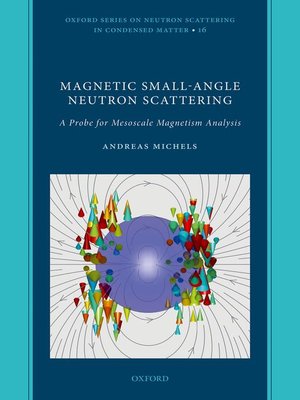Magnetic Small-Angle Neutron Scattering
ebook ∣ A Probe for Mesoscale Magnetism Analysis · Oxford Series on Neutron Scattering in Condensed Matter
By Andreas Michels

Sign up to save your library
With an OverDrive account, you can save your favorite libraries for at-a-glance information about availability. Find out more about OverDrive accounts.
Find this title in Libby, the library reading app by OverDrive.



Search for a digital library with this title
Title found at these libraries:
| Library Name | Distance |
|---|---|
| Loading... |
This monograph provides the first extensive treatment of magnetic small-angle neutron scattering (SANS). The theoretical background required to compute magnetic SANS cross sections and correlation functions related to long-wavelength magnetization structures is laid out. The concepts are scrutinized based on the discussion of experimental neutron data. Regarding prior background knowledge, some familiarity with the basic magnetic interactions and phenomena as well as scattering theory is desired. Besides exposing the different origins of magnetic SANS, and furnishing the basics of the magnetic SANS technique in early chapters, a large part of the book is devoted to a comprehensive treatment of the continuum theory of micromagnetics, as it is relevant for the study of the elastic magnetic SANS cross section. Analytical expressions for the magnetization Fourier components allow to highlight the essential features of magnetic SANS and to analyze experimental data both in reciprocal, as well as in real space. Later chapters provide an overview on the magnetic SANS of nanoparticles and so-called complex systems (e.g., ferrofluids, magnetic steels, spin glasses and amorphous magnets). It is this subfield where major progress is expected to be made in the coming years, mainly via the increased usage of numerical micromagnetic simulations (Chapter 7), which is a very promising approach for the understanding of the magnetic SANS from systems exhibiting nanoscale spin inhomogeneity.







